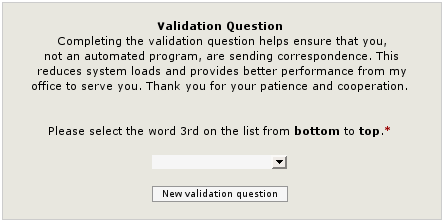Fun With Spam: Yummy Dessert Edition
I don’t know about you, but for me personally, it was enough when they added a camera to my cellphone. Mobile Jell-O seems like a step too far.
Jason Lefkowitz's forlorn hope
I don’t know about you, but for me personally, it was enough when they added a camera to my cellphone. Mobile Jell-O seems like a step too far.

Originally uploaded by jalefkowit.
Click photo for full size image.
Seen in front of a café near the Farragut West Metro.
“Drinkable yogurt and flowers.” WTF?
Longtime readers know that I hate US Airways.
Looks like now I have one more reason to…

Image by Kathryn Cramer on Flickr.
Click photo for full size image.
Sandy and Ginger both think that Israel is overreacting in its response to attacks by Hezbollah, and I’m inclined to agree. But I don’t think the reason why is particularly mysterious.
Israel is simply demonstrating the inability of the modern nation-state to come up with a rational response when directly attacked by non-state actors. Hezbollah is not a state; it’s a private organization. But today private organizations can have arsenals that allow them to directly challenge states on the field of battle.
How directly? Well, Hezbollah is fielding rockets that give them a practical medium-range strike capability — a capability which lets them strike civilians in ways that would otherwise require an air force. They have demonstrated that they can strike naval vessels, too, seriously damaging an Israeli corvette.
These are actions that would be acts of war if they were committed by another state. But how do you declare war on an enemy that has all the destructive potential of a state, but is not itself a state? There’s no capital city you can capture, no industrial infrastructure you can degrade. All there is are people, scattered through the general population.
Israel’s response indicates that they don’t know the answer to this question, and that instead of trying to figure it out, they’ve decided to just pretend that Lebanon equals Hezbollah because doing so allows them to do what they know how to do — make war against states. They pound Lebanon because they don’t know how to reach Hezbollah otherwise.
Of course, this is counterproductive as it only increases support for Hezbollah among the Lebanese, who will naturally cheer anyone who strikes back at the neighbor who bombs them. But it’s all the Israelis know how to do — their military thinking has not evolved far enough to handle the situation they find themselves in.
In fairness to Israel, they’re not alone in this. We in the U.S. had the same problem when we were struck by al Qaeda. Unfortunately for al Qaeda, they had made the mistake of tying themselves to the government of a state — Afghanistan — so we could attack al Qaeda by attacking Afghanistan. But after we did so, when al Qaeda didn’t disappear, we demonstrated the same illogic that Israel is demonstrating by insisting on attacking Iraq. Iraq had nothing to do with 9/11 or al Qaeda, but it was a Bad State and we know how to kill Bad States, so we did what we knew rather than ask hard questions about whether there could be a better way.
(In some ways, this is a variant of the “More Faster” syndrome I’ve decried in the past.)
Some people have been asking these questions. These people are the proponents of “fourth-generation warfare” (4GW for short), and they’ve been working on these issues for many years now. But at the highest levels, the levels where decisions of war and peace get made, they’re mostly ignored; with the results we see before us.
(To see how the current crisis in Lebanon looks through a 4GW lens, I highly recommend you read William Lind’s essay “The Summer of 1914“.)
UPDATE: John Robb disagrees with me; he thinks Israel is waging a 4GW campaign of its own designed to lead to the collapse of the Lebanese state. I’m not convinced; attempting to collapse a state via aerial bombing of civilian populations is nothing new, we tried it for three straight years against Germany in WW2 without success.
I’m 31 today.
Woo-hoo.

(Image shamelessly lifted from FishBowlNY)
The flow|state user interface blog reports that the next version of Microsoft Office will make a small but important UI improvement: disabling Overtype mode by default.
“Overtype mode” is the behavior where pressing the Insert key on your keyboard completely changes how the program works. Usually, when you type new characters into a document, those characters are inserted at the insertion point (that little blinking vertical line), and any characters after the insertion point are automatically moved over to make room. In Overtype mode, though, Office simply replaces the character to the right of the insertion point with the character you typed. This results in existing text being overwritten by the new text, which is a behavior almost nobody ever intends.
(If you don’t understand what I’m talking about, open up a Word document, click somewhere in it to set the insertion point, press Insert on your keyboard, then start typing, and watch as your new text gobbles up your old text.)
This is a welcome change, and it sounds well implemented — you can still turn Overtype mode on via a preference if for some Godawful reason you need it, but the default condition is to have it turned off.
It also illustrates one of the general principles of good UI design, which is that Modes Are Evil because they confuse the user. A “mode” is a condition where doing something in a program produces different results than usual.
Badly designed software is typically full of modes. A particularly egregious example is the UNIX text editor vi, in which you cannot actually make changes to a document without first switching to “insert” mode. Why would you open a document in a text editor if you didn’t want to edit it? This behavior is predictably baffling to a user when they sit down in front of vi for the first time — they start typing, and instead of their words showing up in the document, nothing happens (or worse — because vi starts up in “command mode”, they accidentally type in a command and something seemingly random happens).
Modes are tempting to software developers because they allow more features to be crammed into a program, and sometimes they can’t be avoided; but it’s always worth the effort to try.
I suppose I should let you know that I’m no longer unemployed; I started a new gig today as the online organizer for Change To Win, a coalition of labor unions dedicated to breathing new life into organized labor. It promises to be a pretty cool opportunity, so I’m looking forward to seeing how I can help!
 On HBO’s superlative Deadwood, Al Swearengen (memorably played by actor Ian McShane) gets all the best lines…
On HBO’s superlative Deadwood, Al Swearengen (memorably played by actor Ian McShane) gets all the best lines…
In life you have to do a lot of things you don’t fucking want to do. Many times, that’s what the fuck life is… one vile fucking task after another.
If I bleat when I speak, it’s because I’ve just been fleeced.
Here’s my counter-offer to your counter-offer: go fuck yourself.
I wouldn’t trust a man who wouldn’t try to steal a little.
I’m declaring myself conductor of this meeting as I have the bribe sheet.
Announcing your plans is a good way to hear god laugh.
You want a donkey’s attention, you bring a fucking pole down between his ears.
Dan, don’t you agree that truth, if only a pinch, must season every falsehood, or else the palate fucking rebels?
How does Hearst hope to defeat me? Allied as I am with the imbecile, the contemptible, and the promiscuous fucking insane.
Over time, your quickness with a cocky rejoinder must have gotten you many punches in the face.
Dan Dority: I’m older, and I’m much less friendly to fuckin’ change.
Al: Change ain’t lookin’ for friends. Change calls the tune we dance to.
And my all time favorite, a dialogue between Swearengen and newspaper editor A.W. Merrick (Jeffrey Jones), after Merrick’s presses have been destroyed by local toughs upset by Merrick’s publication of a notice that existing gold claims might be thrown out if Deadwood is annexed to the U.S. Swearengen’s final line is a kind of mini-soliloquy that sums up his character perfectly:
Al: (Sits, lets out a sigh) Why ain’t you up and running again?
Merrick: I’m in despair. The physical damage is repairable, but the psychic wound may be permanent.
Al: (After a pause.) You ever been beaten, Merrick?
Merrick: (Rolls his eyes) Once, when I thought I had the smallpox, Doc Cochran slapped me in the face —
(Al slaps him.)
Merrick: Ah! (He stares at Al, touching his cheek — he leans forward) Stop it, Al.
Al: Are you dead?
Merrick: Well, (touches cheek) I’m in pain, but no, I’m obviously not dead.
Al: And obviously you didn’t fucking die when the Doc slapped you.
Merrick: No.
Al: So including last night, that’s three fucking damage incidents that didn’t kill you. Pain or damage don’t end the world, or despair, or fuckin’ beatings. The world ends when you’re dead. Until then, you got more punishment in store. Stand it like a man — and give some back.
(Many thanks to HBO’s episode guide, the Deadwood Transcripts site, and the quotes thread on Television Without Pity’s Deadwood forum for archiving all Al’s wisdom for posterity.)
OK gang, it’s question time.
I spent the first half of 2005 doing a lot of thinking about online newspapers — specifically, about what newspapers needed to do to stay relevant in an age when people are abandoning print in droves for the Web.
One thing that seemed obvious to me was that an online newspaper could do a lot of stuff that a print version could not; and that no papers at the time were really taking advantage of that opportunity. Most papers didn’t even have hyperlinks in stories, much less more advanced features like letting users write their own content, tagging stories, blog aggregation, and so forth.
Then Newsvine launched, and it looked like the complete realization of everything I’d been thinking about. It’s a news site, but with a ton of unique, innovative features, including all the ones I noted above and a lot more. They’ve even extended their innovation to the business model — if you write something on Newsvine, you get 90% of the ad revenue that they gather through that page, creating a strong financial incentive for people to participate.
Here’s the paradox, though. Newsvine looks like everything I dreamed of in an online paper. So why don’t I read it?
It’s not like I haven’t tried. I periodically throw their RSS feeds in my aggregator and remind myself to check their site. I even dipped into participating, setting up a Newsvine column of my own to play around with. But after a little while I inevitably fall away from the site.
Why is that?
I can’t figure it out. So I thought I’d ask you, my Teeming Millions of readers. Is there something about this site that I’m missing? Why doesn’t the practical experience of using Newsvine seem as cool as the idea of Newsvine? Help me figure it out, leave your thoughts in the comments…
Per my recent post about how to find movies you’ll love, I’m going to go out on a limb with this prediction: the upcoming Miami Vice movie will, I predict, be pretty damn good.
This may be counterintuitive, because the Miami Vice TV show looks today like a piece of high camp. And I don’t think anybody would say that the show was so consequential that viewers were screaming to the heavens “Bring this to the big screen, I beg you!!!”.
So why am I bullish on Miami Vice, the movie? Three words: writer-director Michael Mann.
Michael Mann is one of my favorite directors. After spending the 80s directing schlock (and writing for several TV series, including Miami Vice), he broke out in the early 90s and has been doing work of remarkably high quality ever since:
Mann’s The Last of the Mohicans is one of my favorite movies — he took James Fenimore Cooper’s novel (which hasn’t aged well) and turned it into a lush, beautiful adventure-romance that’s endlessly watchable. It also has the best soundtrack of any movie I’ve ever seen, period (you should get the CD).
His other work is great too — Heat is a great crime drama, watch it and you’ll get a sense for why I think Mann can make material like Miami Vice work in spite of itself; and The Insider and Collateral are top shelf too. (I liked Ali but found it a bit overlong; it’s good, but it’s not Mann’s best work.)
All of which is why I think Miami Vice will turn out better than it has any right to be. I’m looking forward to it.
If I were an astronaut, I sure wouldn’t be thrilled to see stories like this showing up before my flight:
Nasa is to launch the space shuttle Discovery on 1July, despite warnings from senior safety officials and engineers that it is not safe to fly…
Safety officials said modifications carried out since the problem recurred a year ago were still not enough.
But managers decided to go ahead, insisting the crew was not at risk.
“There were very different viewpoints on the issue ofwhether we were ready to fly or not,” Nasa administrator MichaelGriffin told a news conference.
“I can’t possibly accept every recommendation given to me by every member of my staff, especially when they all don’t agree.”
Maybe not, but you could always make your default position to hold back from launching if a significant portion of your staff thinks going ahead would put lives at risk, no?
(For more background on why the Shuttle program is so screwed up, here’s a post I wrote in 2003 on the subject.)
Here’s something cool to liven up your Friday: the MIT Media Lab’s I/O Brush.
Cecilia Weckström calls it “the coolest thing since the invention of Photoshop“, and if you watch the video I think you’ll be inclined to agree!
Boy, did this one drive me nuts!
As mentioned earlier, I’ve been working out the kinks in the KDE version of Ubuntu Linux (“Kubuntu”) on my home PC. One thing that I couldn’t figure out was why none of the multimedia apps bundled with Kubuntu (Kaffeine, AmaroK, etc.) could play back music — but when I downloaded non-standard apps like VLC, they played music just fine.
I finally found the answer this evening. Apparently there’s a known issue with Kubuntu where an important codec package does not get installed, which results in the no-sound-with-bundled apps problem because all the bundled apps rely on the same library (Xine) for audio processing.
It’s easy to fix, once you know what the problem is — just install the libxine-extracodecs package, either by using Adept or by going to the console and typing the following:
sudo apt-get install libxine-extracodecs
Now if I could just figure out why my printer won’t print…
As I’ve mentioned before, I run the popular Linux distribution Ubuntu on my home PC. Recently, the Ubuntu team pushed out a new release of their distro, named “Dapper Drake”. So I decided yesterday that I should update my Ubuntu to Dapper, the latest and greatest.
However, I decided at the same time to complicate things a little bit: rather than sticking with plain Ubuntu, which uses GNOME as its window manager, I decided to try switching to its KDE-powered cousin, Kubuntu. (Mostly this was due to curiousity aroused when I heard Mark Shuttleworth, the zillionaire behind the Ubuntu project, say in an interview that he preferred Kubuntu to standard Ubuntu.)
Blowing away my old Ubuntu install and replacing it with Kubuntu was easy enough, and so far I’m pretty satisfied with the user experience — KDE isn’t nearly as geek-oriented as I remember it being the last time I tried it, a couple of years ago. GNOME’s not bad either, but I can see the appeal of KDE.
However, there is one KDE-ism that I can’t figure out: application defaults. I want to set Firefox as my default browser, in place of Konqueror. But the “Set as default” option in FF doesn’t seem to work, and I can’t find a control panel or config file where I can specify this manually. How’s it done? Anyone out there know?
And as long as we’re at it, which do you prefer: GNOME or KDE? (And here’s a third option: I’m told you can get seriously lickable eye-candy in Linux by using Xgl as your window manager. But installing Xgl looks hella complicated. Anyone tried it?)

The online activism community is up in arms (if traffic on mailing lists is any indication) about a recent decision by the administrative offices of the House and Senate — which handle e-mail services for members — to begin offering a “logic puzzle” feature on the web forms they provide for constitutents to e-mail House members.
There’s a lot of people very upset by this. But is it really a body blow to online activism? Or is it a predictable response to a flawed campaign model?
A place you’re going to be hearing a lot more about very soon: Haditha.
… is the documentation.
It’s not that it’s badly written; it’s reasonably clear in that sense. Rather, the problem comes from the way PHP is structured.
The “core” PHP language is pretty simple — it covers only the most minimal basics, things like operators, looping constructs, and so on. This makes PHP very easy for newbies to pick up.
However, once you start to actually try to do something useful with PHP, you find yourself needing functionality that isn’t in the core language. That means turning to PHP’s function libraries. And, to be frank, they’re a mess.
Look at that picture over on the left. That’s the part of the PHP Manual’s table of contents that lists all the function libraries you have access to. And that’s only ones whose name starts with A through F — the whole list (up to Roman numeral CLXXVII!) is so long that there’s no way I could include it on my home page. (Click the pic over there on the left to load a shot of the whooole list.)
Now, having lots of libraries isn’t necessarily bad — Java has an even more Herculean list. It only becomes a problem when you make no distinctions between them in the docs — like PHP. In Java, it’s easier to “discover” the class you need because classes are grouped together by broad areas of functionality; if you want to connect to a database, for example, you start with JDBC and then find your particular database under there.
PHP, though, just throws a huge list of libraries at you and leaves you to figure out which one you need. There’s no overarching “Database” package — instead you get Postgres functions and Oracle functions and Firebird functions and MySQL functions, all sprinkled throughout the list. What’s worse, in some cases there are two or three function libraries listed for the same topic, with no indication of which is the “preferred” one. Take MySQL, for instance; there are three function libraries for connecting to it:
Now, if you click through to each of those, you find pretty quickly that (if you have PHP5 installed) there’s really no reason to be using the first one — it lacks built in protection against SQL injection attacks. As for the other two, the first one conforms to the new “PHP Data Objects” (PDO) standardized abstraction layer spec, while the other does not; but the other one has some nifty features the PDO version lacks. Putting aside the question of why offer two libraries instead of just one, why not put all the PDO libraries off in a “PDO” category for those who want to use that model, and leave the other one in the list for everyone else? (Or put all the non-PDO ones off into a separate category if you want to push PDO, I don’t care.) And why not push that first one off into a “Deprecated” category so it’s clear that it’s for legacy code only?
Even worse, the list is cluttered up with libraries that would only be of interest to a very small number of developers. This means that function libraries that might be broadly useful get lost under a pile of things that only a couple of people care about. “Net_Gopher“? “Credit Mutuel CyberMUT functions“? “YAZ Functions“? What the hell? How many people ever need these?
Clicking through for more info on them isn’t particularly enlightening, either. Here’s how the page on “YAZ Functions” starts:
This extension offers a PHP interface to the YAZ toolkit that implements the Z39.50 Protocol for Information Retrieval. With this extension you can easily implement a Z39.50 origin (client) that searches or scans Z39.50 targets (servers) in parallel.
The module hides most of the complexity of Z39.50 so it should be fairly easy to use. It supports persistent stateless connections very similar to those offered by the various RDB APIs that are available for PHP. This means that sessions are stateless but shared among users, thus saving the connect and initialize phase steps in most cases.
Oh, you don’t say! It helps me connect my YAZ toolkit to my Z39.50 origin via the Hassenframmel Protocol? Well, that clears everything right up, now doesn’t it. I’ll put that on the shelf right next to my flux capacitor.
For things like this, you either know you need them or you don’t need them. So why not take all the libraries that are only of limited interest, and push them off into a “Vendor-Specific Tools” category, or a “Miscellaneous/Other” category, or a “If You Have to Ask…” category? Why have them on the same list as “Hash functions” and “Array functions”, things which every PHP developer will need?
I’ve been trying to get up to speed on the changes that came with PHP5, and when the documentation is this confusing, it ain’t easy. If there’s interest, maybe I’ll take a crack at reorganizing the PHP Manual to be a little more sane. If you think something like that would be useful for you, say so in the comments.
I agree with the commenters: this would make a perfect album cover for somebody…
I suppose that I should let you know that as of this week I’m no longer with Democracy In Action.
Why? Suffice it to say that during my time there, I had some fundamental differences of opinion with the principals about the direction of the organization, and ultimately it’s their organization to do with as they wish. So it’s probably best for everyone involved that we part ways.
Now it’s on to the next thing, which I’m still in the process of formulating. If you’ve got suggestions and/or know somebody who’s interested in hiring a developer of high-quality, kick-ass, user-focused open source software, drop me a line!
Some of you may be wondering why I took the time to write a post beating up on screenwriter Akiva Goldsman for being a consistent generator of cinematic rubbish.
Part of the answer is that it annoys me to see someone getting rich by churning out crap. But only part.
The bigger factor is that it amazes me how few people understand how to find movies that they’re actually going to like. This is because they don’t understand the factors that make good or bad movies good or bad, so they make choices based on secondary factors, then are surprised when those choices lead them to movies they don’t like.
So, rather than beat up further on Goldsman, I thought I’d take a moment to share Jason’s Foolproof Method for Finding New Movies You’ll Love.
It’s pretty simple:
That’s all there is to it. Seriously. I guarantee that if you follow this method you will find more great new movies in less time than you ever thought possible.
Why? Because the two people who have the most direct influence over a movie are the director and the screenwriter. The screenwriter creates the skeleton on which the movie hangs; the director turns the skeleton into flesh and blood. Everybody else involved in making the movie is working in the service of these two people. Therefore, the two most consistent guides to how well a movie will match your tastes are who wrote it and who directed it.
Most people, when they are at the video store or are putting together their Netflix queue, seem (in my observation) to think instead that the best guide is whether the movie stars an actor or actress whose other work they have enjoyed. People say things like “I love Harrison Ford movies” all the time. But what is a “Harrison Ford movie”? Ford has acted in a ton of movies that are scattered across a range of themes and genres; some are great, some are not. Knowing that Harrison Ford is in a movie doesn’t tell you much about the movie, except maybe that it has a big budget (and thus can afford the services of Harrison Ford).
Directors and screenwriters are much better guides to quality, tone, and theme. Where talking about “Harrison Ford films” doesn’t tell you much, talking about “David Lean films” tells you exactly what to expect: epic stories in exotic locations (Lean directed Lawrence of Arabia, The Bridge on the River Kwai, and Doctor Zhivago, among others). Similarly, when you see that Joe Eszterhas is the screenwriter of a film, you know that it’s probably a cheesy exploitation film with a higher-than-average dosage of sex and violence (Eszterhas wrote Showgirls, Basic Instinct, and Flashdance, among others).
Like lavish fantasy movies? Check out anything by director Terry Gilliam.
Like gritty dramas salted with strong language? Check out anything written by David Mamet.
Like super-dark comedy? You’ll love anything from Neil LaBute.
So — if you’re interested in finding new movies to watch, and don’t want to waste your time and money on crap, start paying attention to who writes and who directs the movies you’re watching. I think you’ll be pleasantly surprised by the results.
Well, “The Da Vinci Code” is finally out in theaters, and it looks like my hunch was correct; Rotten Tomatoes has it with only 16% positive reviews, putting it at the same level of cinematic artistry as last year’s epic films “Doom” (19%) and “The Dukes of Hazzard” (15%). (For 2004, RT found no movies as poorly reviewed as “Da Vinci”.)
So how do you turn a mega-selling potboiler into a big, steaming pile? Undoubtedly there’s going to be people blaming director Ron Howard, but there’s a much more likely suspect: screenwriter Akiva Goldsman.
Goldsman, who wrote the screenplay for “Da Vinci Code”, has been cranking out reliably awful scripts since the mid-90s:
Writer – filmography
- I Am Legend (2007) (announced)
- The Da Vinci Code (2006) (screenplay)
- Cinderella Man (2005) (screenplay)
- I, Robot (2004) (screenplay)
- A Beautiful Mind (2001) (written by)
- Practical Magic (1998) (screenplay)
- Lost in Space (1998) (written by)
- Batman & Robin (1997) (written by)
- A Time to Kill (1996) (screenplay)
- Batman Forever (1995) (screenplay)
- Silent Fall (1994) (written by)
- The Client (1994) (screenplay)
With the possible exception of “A Beautiful Mind”, that’s an unbroken stretch of big-budget Hollywood stink bombs. (Maybe “I Am Legend” will be Goldsman’s big break into non-suckiness. Somehow I doubt it.) The average Rotten Tomatoes score for an Akiva Goldsman-penned movie is a whopping 46%.
Goldsman proudly told an interviewer from the LA Times that he does as little thinking as possible while writing:
He follows what seems to be the classic rule book on how to become a successful Hollywood screenwriter. He swears by screenwriting guru Robert McKee, eschews writing original scripts, and worships at the altar of the three-act structure.
“The screenplays I write are formally very predictable,” Goldsman says. “They’re essentially the one-page version of a clothing dummy. They have two legs, a middle, two arms and a head. I can dress them up pretty on a good day, but the structure is simple, and I like that.”
(Robert McKee is the paint-by-numbers screenwriting teacher who wrote “Story” and was lampooned in the riotously funny movie “Adaptation“.)
Interestingly, “A Beautiful Mind” — which earned Goldsman an Oscar for his screenplay — is the only screenplay he’s written since 1994’s “Silent Fall” that he didn’t adapt from someone else’s original work. So anyone with any sense of probability could probably have guessed that the “Da Vinci Code” screenplay would be pretty ripe as soon as they heard Goldsman was attached to it.
Thank God for YouTube. Without it, how would we get such hilarious things as this?
This is supposed to be hilarious, right? Right? Because anyone who actually, you know, listens to the lyrics while watching jingo-tastic clips of U.S. soldiers blowing the shit out of Iraq who doesn’t bring a healthy sense of irony to the whole thing is gonna get a serious case of whiplash.
(For bonus points, leave a comment explaining why the title of this post is actually savagely witty and relevant to the subject, instead of a typo.)

Photo of Phil Hendrie by Debra DiPaolo for LA Weekly
Since most of you probably have never heard the Phil Hendrie Show, of which I waxed so rhapsodically last week, I have after considerable time and effort managed to put together a taste for you.
This is a segment from the show that aired in the spring of 2003. It’s a great illustration of the kind of dark wit that is Hendrie’s specialty. In it, he interviews “Don Parsley”, a character whose son supposedly died during the invasion of Iraq.
Some things to remember as you listen:
OK, in the immortal words of Marty DiBergi, “Enuffa my yakkin’. Whaddaya say, let’s boogie!” Without further ado, here’s the audio:
(I wonder how long it’s going to be until this post earns me a C&D letter?)
If you like what you hear, you can buy “best-of” CDs of the show from My Friend’s Place, a shelter for runaway and homeless kids in Hollywood. Hendrie donates 100% of the profits from CD sales to the center — a policy that has raised more than a million dollars for them over the years.